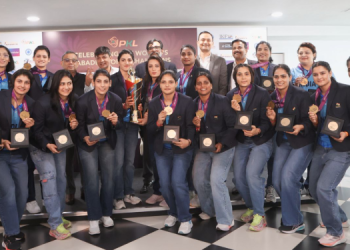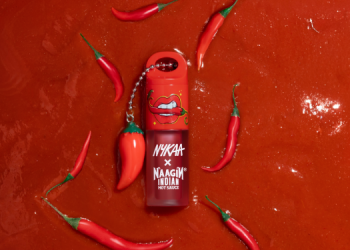Bengaluru-based Go Desi is bringing forgotten regional flavours in the form of handmade treats with no added preservatives. The FMCG brand offers tangy, sweet, masala and chatpata products like Desi Popz (lollipops), Desi Bytes (sundried fruit bites with natural spices), Desi Meetha (single serve meetha bars) and Desi Mints Meetha Paan to name a few. The brand follows a manufactured, sourced, and branded at the farm gate process. It claims to be growing 80 pc year on year and is on track to do Rs.50 cr this (financial) year. And it wants to double that number next year.
The concept of Go Desi was born in 2018 when Vinay Kothari, its Founder, was on a trek in the Western Ghats.
“Before Go Desi, I was working with a major FMCG company. I decided to take a break and was trekking along with my sister Raksha Kothari, where I saw a local selling some jackfruit candy. I came to know that the products were sold by a self-help group,” recalls Kothari, in a telephonic conversation with Medianews4u.com.
The brother-sister duo picked up 30 kilos of the products from the self-help group and set up a flea market once they were back in Bengaluru.
“The entire lot of products got sold out on the first half day. That was a revelation for me and I sensed a business opportunity in creating a large consumer brand out of forgotten regional Indian flavours,” says Kothari.
On the thought process that went in while setting up Go Desi, he adds, “If you look at the history of consumer brands in India, they have been created in Western formats of chocolates, chewing gum, candies, biscuits, breads etc. That essentially is because most of the MNCs came to India foreseeing the potential it held and they wanted to change the consumer behaviour of Indians. We were used to eating roti, khakhra, parantha etc. We were not used to eating biscuits. Hence these MNCs had to create brands to change the behaviour.”
“The thought process that went while setting up Go Desi was that if you can create brand experience which can match an MNC brand, then there could be a large business that could be created. At the same time, we can empower a lot of micro entrepreneurs in rural areas who create such products,” he explains.
Around 260 women are working with Go Desi and 40 pc of the value consumers pay goes back to the rural economy.
“If we wouldn’t have created manufacturing units and facilities in rural India and not made most of the products by hand, we wouldn’t have got authenticity and nostalgia experienced by the consumers. We wouldn’t have been able to stay true to that and that has essentially led to the love that we got for our products. We buy jaggery and tamarind directly from the farmers. Currently, we have two micro units and the third one is coming up in Bidadi and we have four self help groups that work with us,” he adds.
Ramping up presence
The brand which is largely dominant in the South has a presence in 45,000 stores all over India.
“We bill 15,000 stores in Karnataka. Andhra Pradesh and Telangana put together would be 8,000 to 9,000 stores. Tamil Nadu and Kerala would be approximately 5,000 to 6,000. If you put it together, North, East, and West have small pockets where we are strong. We have a stronger presence in Kolkata, Delhi, Mumbai,” says Kothari.
The brand also has 20 company-owned stores with its flagship stores in Vega City and Shanthinikethan Mall in Bengaluru.
“We are planning to open around 100 stores in Karnataka alone. It is work in progress and hopefully we will achieve that by March 2024. We are currently concentrating in Karnataka and from there we will expand to other regions,” he notes.
In Karnataka, the brand’s sales split is 55 pc is offline, 30 pc online which includes market places, quick commerce, and own website, and 15 pc from kiosks. The average bill value of the brand on its own website is Rs.450. Among products, Desi Popz is the highest selling product for the brand.
‘Sakkath Desi’
The brand recently launched a campaign in the state themed ‘Sakkath Desi, Sakkath Chatpata’.
Kothari says, “It was a TV campaign. A few months back we have done a TVC starring Kannada film star Upendra. After that we have done digital campaigns focusing on large cities like Mysore, Bengaluru etc. We have recently executed an OOH campaign in Mangalore. In the coming month, we will be executing an OOH campaign in Bengaluru.”
The brand is targeting GenZ through these campaigns.
“People who have an element of nostalgia attached to our products, pick it up without hesitation. It is the GenZ we need to expose our products to. We are not trying to be an alternate to the West, but want to see a desi product as the credible alternative to other products. For example, when you are having a lolly pop, can you try having a desi pop which is much better in taste because it has all natural flavours and no refined sugar in it. The awareness level among the GenZ audience about our products have gone up by 40 pc post the campaign release. The top-of-mind recall has also improved. Go Desi is currently perceived by GenZ as a brand with unique chatpata flavours, which are authentically Indian,” he explains.
On the brand’s association with actor Upendra Rao, Kothari notes, “When we onboard a celebrity like Upendra, the credibility of the brand increases. A celebrity association gives out the message that the brand is serious enough to be able to invest in a large celebrity. It gives a lot of credibility for a young product like us.”
For the brand 55 pc of the ad spends go towards TV, while outdoor and BTL activities would take up 15 pc and the rest 30 pc being digital.
On the expansion plans, Kothari adds, “We are very focused on South India. The brand doesn’t have plans to expand outside India. We are getting demand from the US, which we supply to as the exporter. We are very excited about our category Desi Meetha to which we are adding more products. It is doing extremely good online and we have grown 3X over the last year. We have launched Diwali boxes in the category, through which we want consumers to think beyond the typical sweet boxes. In terms of revenue, we want to double our turnover next financial year.”
Feedback: [email protected]
















